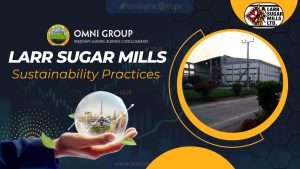” Alternative Lifestyle Festival: towards sustainable future ” | GNN INFO
”
KARACHI:
Often, environmental degradation is accepted as a necessary evil if it can ensure economic growth and development. But this caveat can become a compounding catalyst for catastrophe, particularly for countries like Pakistan, which simultaneously struggle with lagging economic growth and environmental instability.
Considering the country’s unsteady economic situation and its position as one of the worst impacted by global climate change, the need for more sustainable alternatives is imperative. And to this end, looking towards options closer to home may have the answers.
As Shaista Ayesha, CEO of the social impact ecosystem development and impact investment organisation SEED Ventures, explained “given the economic challenges, supporting local brands is an alternative to building the economy.”
To this end, under the banner of their sustainability platform, What’s The Alternative (WTA), Ayesha and her team curated and crafted the “Alternative Lifestyle Festival.”
Living up to WTA’s focus on the environment, lifestyle, and wellness, the event took place at Beach Luxury recently, and was open to the public free of cost. It functioned as a community-focused, transformative gathering that offered insight, highlighted sustainable ventures, and created spaces for creativity and learning.
As the latest on the WTA roster, the festival focused on the lifestyle aspect of the platform bringing together locals looking for sustainable alternatives and the industry leaders spearheading those changes.
Like all WTA events, the festival combined insight with enjoyment. To draw attention towards pathbreakers championing alternative methods of production and growth, the festival hosted an insightful panel discussion aptly titled “Choices For Change” where experts from various fields weighed in on the need for alternative approaches to growth.
Andleeb Uroos Ahmed of Philip Morris (Pakistan) Limited noted that the sustainability agenda is integrated within the structure of the business itself, a notion that is perfectly encapsulated by the parent company’s global focus on smoke-free alternatives.
Commenting on the “product transformation” that is taking place within the firm, Uroos emphasised, “we are moving towards less harmful alternatives.”
Read: Is this economic stability sustainable?
Simultaneously, she noted that the company is keenly aware of its footprint and has championed campaigns aimed at reducing littering and encouraging recycling among others.
It was encouraging to see leaders from industries that are not always at the forefront of sustainability initiatives because it suggested a shifting of trends.
Sadia Dada, Chief Marketing and Communications Officer at K-Electric, acknowledged as much, saying “I know that the power sector is really the last place where this conversation takes place.”
At K-Electric, she emphasised, the shift towards a more sustainable path took into account that the power sector is both necessary and simultaneously one of the most significant contributors to environmental damage. The approach adopted by K-Electric set out a model that produced the energy needed sustainably, while simultaneously offsetting some of the negative byproducts of the energy sector and helped develop a “pathway to progress.”
Sustainable fashion connoisseur Hasan Shehryar Yasin shared the importance of being very selective about what you attach your name to.
Commenting on fashion trends that negatively impact the environment, he noted, “fabric wastage is a problem. And it is going to be a looming problem very quickly because the consumption and hunger for consumption of fashion seems to grow more and more.”
In light of this, he emphasised that “as a responsible citizen not just of Pakistan but a citizen of the world, I must be very clear about where I place my influence.”
As a proponent of craft and tradition, he staunchly stated, “we do not do fast fashion.” Choosing instead to offer his customers a refurbishing service, where they could bring in their HSY pieces and have them revamped.
A leader in the farm-to-table space and co-founder of Karachi Farmer’s Market Sarah Nasiruddin shared her journey of creating a platform for clean producers and the consumers who want to support them.
Reflecting on the ultimate success of the platform, she shared that “people have started noticing changes in their health.” She noted enthusiastically “a lot of their health issues went away.”
Reflecting on the progress made by the Karachi Farmer’s Market, her ultimate takeaway was that “local, seasonal, and clean food” is a must for a sustainable future.
During a fireside chat with environmentalist and horticulture maestro Tofiq Pasha and US-trained child and adult psychiatrist and CEO & Founder of Synapse, Dr Ayesha Mian, delved into mindful eating and lifestyle choices and offered valuable tips on how to make food a meaningful part of one’s life.
A longtime proponent of conscious living and consumption, Tofiq Pasha spoke at length about the importance of mindful living, and preserving the earth. He offered thought-provoking insights into the nuanced art of living consciously, urging attendees to reflect on their daily choices and adopt practices that align with both personal well-being and the natural world.
Reflecting on the collective new normal where alarming rates of mental health disorders alongside health concerns that are on the rise, Dr Ayesha Mian stated that while “Covid has faded” but it has left another kind of “pandemic or endemic” in its wake.
She emphasised that while “all the focus goes on tertiary care when everything has already gone wrong”, “prevention” is something that we all have to look towards championing.
In a bid to champion and celebrate sustainable and healthier alternatives, the event also included a dynamic market brimming with eco-friendly products, organic food and drink options, and sustainable alternatives for fashion, technology, and craft.
Vendors focusing on health and wellness shared space with educational and non-profit organisations. Particular attention was given to sustainability-focused startups.
Wholesome food outlets such as Organi’Kio and The Panjiri delighted the taste buds with hearty, earth-friendly options. Labels like Libas showcased contemporary fashion pieces inspired by traditional craft.
While eclectic brands like Tween The Knots and Dastaan offered home decor pieces that were truly one of a kind, skincare aficionados could also sample organic products from the likes of 100% Wellness Co. While fitness enthusiasts found their haven with booths from the renowned gym TriFit and the esteemed Karachi trainer Mantaha, encouraging everyone to embrace physical activity as an integral part of their well-rounded lifestyle.
The writer is a Pakistani-Canadian content creator and writer, who has written extensively about Pakistan with a particular focus on sustainability. Her work has appeared in Pakistani and North American publications
Published in The Express Tribune, March 4th, 2024.
Like Business on Facebook, follow @TribuneBiz on Twitter to stay informed and join in the conversation.
”



